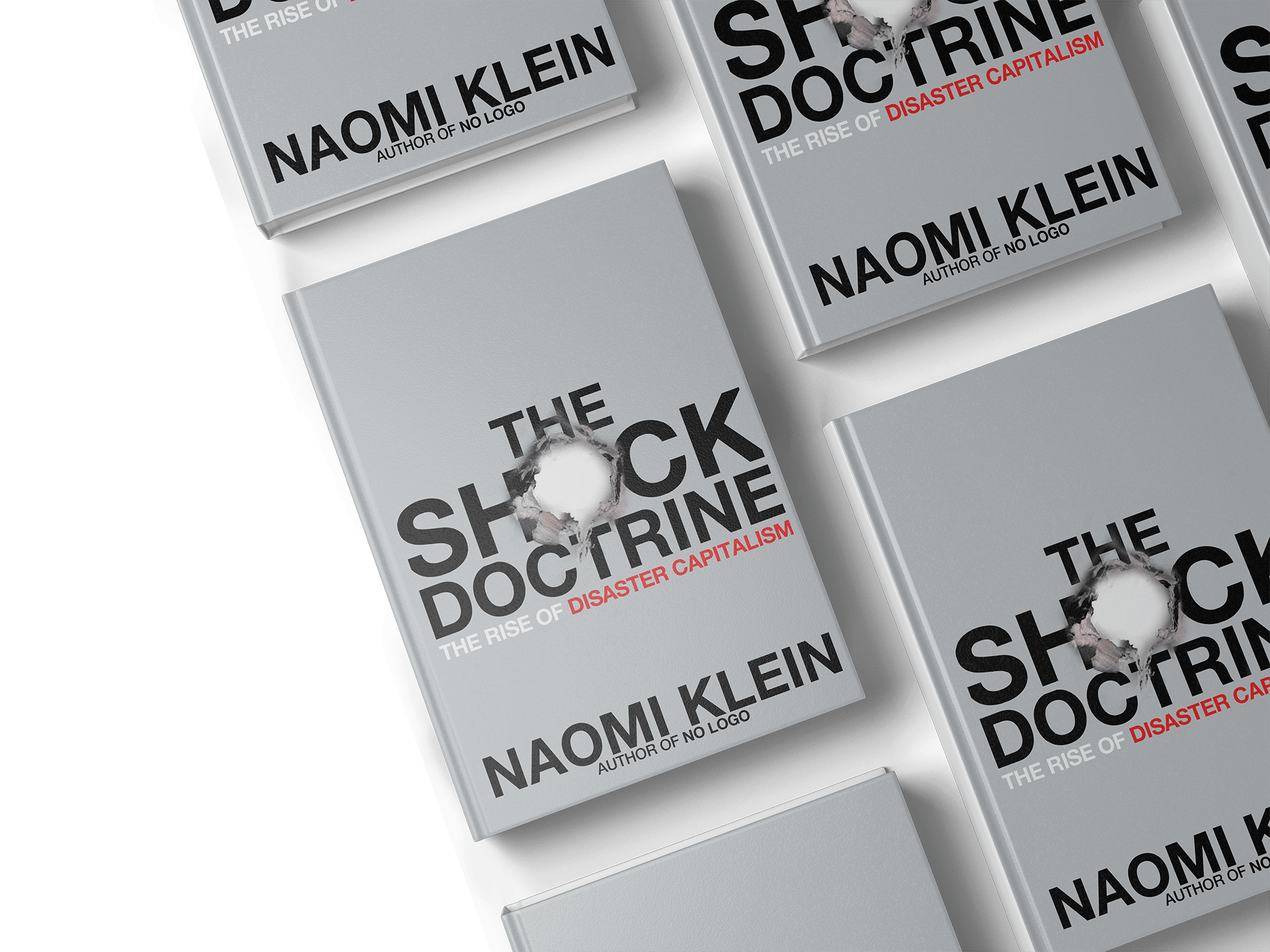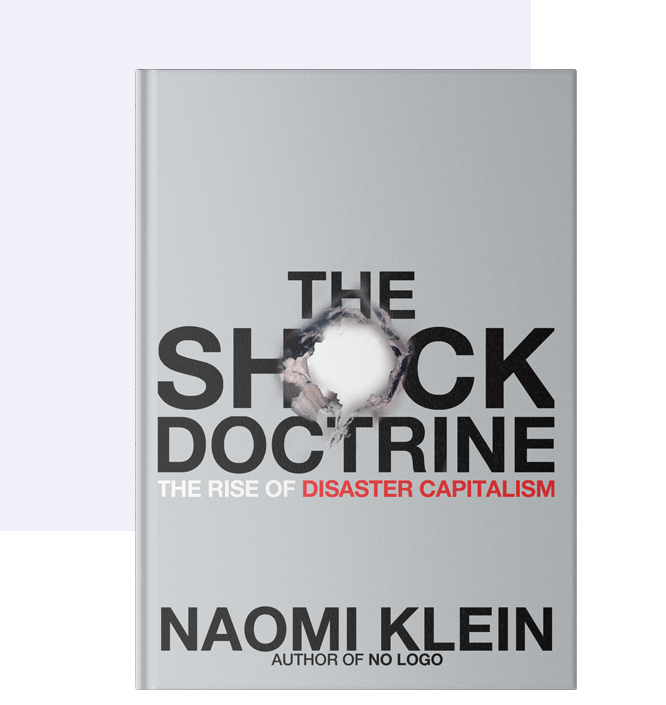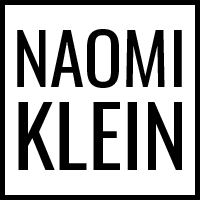
Information is Shock Resistance. Arm Yourself.

About
the Book
The Book
The New York Times and International #1 bestseller, Winner of the 2009 Warwick Prize for Writing and translated into over 30 languages. The Shock Doctrine was originally published in September 2007.
Naomi Klein’s third book, The Shock Doctrine is the unofficial story of how the “free market” came to dominate the world. But it is a story radically different from the one usually told. It is a story about violence and shock perpetrated on people, on countries, on economies.
Based on breakthrough historical research and four years of on-the-ground reporting in disaster zones, Klein explodes the myth that the global free market triumphed democratically, and that unfettered capitalism goes hand-in-hand with democracy. Instead, she argues it has consistently relied on violence and shock, and reveals the puppet strings behind the critical events of the last four decades.
The six minute companion film, created by Oscar Award winning director Alfonso Cuarón, was an Official Selection of the 2007 Venice Biennale and Toronto International Film Festivals.

About the Book
The Book
The New York Times and International #1 bestseller, Winner of the 2009 Warwick Prize for Writing and translated into over 30 languages. The Shock Doctrine was originally published in September 2007.
Naomi Klein’s third book, The Shock Doctrine is the unofficial story of how the “free market” came to dominate the world. But it is a story radically different from the one usually told. It is a story about violence and shock perpetrated on people, on countries, on economies.
Based on breakthrough historical research and four years of on-the-ground reporting in disaster zones, Klein explodes the myth that the global free market triumphed democratically, and that unfettered capitalism goes hand-in-hand with democracy. Instead, she argues it has consistently relied on violence and shock, and reveals the puppet strings behind the critical events of the last four decades.
The six minute companion film, created by Oscar Award winning director Alfonso Cuarón, was an Official Selection of the 2007 Venice Biennale and Toronto International Film Festivals.
About the Book
Description
An investigation that spans four decades of history, from Chile after Pinochet’s coup to Russia after the collapse of the Soviet Union, from Baghdad under the US “Shock and Awe” attack to New Orleans after Hurricane Katrina. “Shock doctrine” describes the brute tactic of systematically using the public’s disorientation following a collective shock—wars, coups, terrorist attacks, market crashes, natural disasters—to push through radical pro-corporate measures, often called “shock therapy.”
Based on breakthrough historical research and four years of on-the-ground reporting in disaster zones, Klein explodes the myth that the global free market triumphed democratically, and that unfettered capitalism goes hand-in-hand with democracy. Instead, she argues it has consistently relied on violence and shock, and reveals the puppet strings behind the critical events of the last four decades.
The Shock Doctrine retells the story of the most dominant ideology of our time, how the “free market” came to dominate the world — Milton Friedman’s free market economic revolution. In contrast to the popular myth of this movement’s peaceful global victory, Klein shows how it has exploited moments of shock and extreme violence in order to implement its economic policies in many parts of the world from Latin America and Eastern Europe to South Africa, Russia, and Iraq. A program of social and economic engineering that is driving our world, that Naomi Klein calls “disaster capitalism”.
Klein vividly traces the origins of modern shock tactics back to the economic lab of the University of Chicago under Milton Friedman in the 60s, and beyond to the CIA-funded electroshock experiments at McGill University in the 50s which helped write the torture manuals used today at Guantanamo Bay.
At the core of disaster capitalism is the use of cataclysmic events to advance radical privatization combined with the privatization of the disaster response itself. By capitalizing on crises, created by nature or war, Klein argues that the disaster capitalism complex now exists as a booming new economy, and is the violent culmination of a radical economic project that has been incubating for fifty years.
Thrilling and revelatory, The Shock Doctrine cracks open the secret history of our era. As John Gray wrote in The Guardian, “There are very few books that really help us understand the present. The Shock Doctrine is one of those books.”
An investigation that spans four decades of history, from Chile after Pinochet’s coup to Russia after the collapse of the Soviet Union, from Baghdad under the US “Shock and Awe” attack to New Orleans after Hurricane Katrina. “Shock doctrine” describes the brute tactic of systematically using the public’s disorientation following a collective shock—wars, coups, terrorist attacks, market crashes, natural disasters—to push through radical pro-corporate measures, often called “shock therapy.”
Based on breakthrough historical research and four years of on-the-ground reporting in disaster zones, Klein explodes the myth that the global free market triumphed democratically, and that unfettered capitalism goes hand-in-hand with democracy. Instead, she argues it has consistently relied on violence and shock, and reveals the puppet strings behind the critical events of the last four decades.
The Shock Doctrine retells the story of the most dominant ideology of our time, how the “free market” came to dominate the world — Milton Friedman’s free market economic revolution. In contrast to the popular myth of this movement’s peaceful global victory, Klein shows how it has exploited moments of shock and extreme violence in order to implement its economic policies in many parts of the world from Latin America and Eastern Europe to South Africa, Russia, and Iraq. A program of social and economic engineering that is driving our world, that Naomi Klein calls “disaster capitalism”.
Klein vividly traces the origins of modern shock tactics back to the economic lab of the University of Chicago under Milton Friedman in the 60s, and beyond to the CIA-funded electroshock experiments at McGill University in the 50s which helped write the torture manuals used today at Guantanamo Bay.
At the core of disaster capitalism is the use of cataclysmic events to advance radical privatization combined with the privatization of the disaster response itself. By capitalizing on crises, created by nature or war, Klein argues that the disaster capitalism complex now exists as a booming new economy, and is the violent culmination of a radical economic project that has been incubating for fifty years.
Thrilling and revelatory, The Shock Doctrine cracks open the secret history of our era. As John Gray wrote in The Guardian, “There are very few books that really help us understand the present. The Shock Doctrine is one of those books.”
Honors
Awards
Warwick Prize for Writing—Winner of the Inaugural prize in 2009
Los Angeles Times Book Prize—Finalist
National Business Book Award of Canada—Finalist
New York Public Library Helen Bernstein Book Award for Excellence in Journalism—Finalist
Canadian Booksellers Association Libris Awards for Author of the Year and Non-Fiction Book of the Year—Finalists
Honors
Awards
Warwick Prize for Writing—Winner of the Inaugural prize in 2009
Los Angeles Times Book Prize—Finalist
National Business Book Award of Canada—Finalist
New York Public Library Helen Bernstein Book Award for Excellence in Journalism—Finalist
Canadian Booksellers Association Libris Awards for Author of the Year and Non-Fiction Book of the Year—Finalists
Top Pick
Best Book of the Year
A New York Times Critics’ Pick of 2007
A San Francisco Chronicle Notable Book of the Year
An Amazon Top 10 Editors’ Pick ‘Current Events’ Book of the Year
An Amazon Top 10 Editors’ Pick ‘Business Narrative’ of the Year
A Barnes & Noble Top 10 ‘Politics & Current Affairs’ Book of the Year
A Publishers Weekly Best Book of the Year
A Quill & Quire Best Book of the Year
A Sueddeutsche Zeitung Best Nonfiction Book of the Year
One of The Village Voice‘s 20 Best Books of the Year
One of The Kansas City Star’s Top 100 Books of the Year
A St. Louis Post-Dispatch Best Book of the Year
Co-Winner of Alternet‘s Best Progressive Books of 2007 Contest
One of the Dayton Daily News’ Favorite Nonfiction Books of the Year
A PopMatters Best Book of 2007
An E! Online Best Pick for 2007
An Observer Favorite Book of the Year
Metro London‘s Best Non-Fiction Book of the Year
The Scotsman‘s Pick of the Year
A Sunday Herald Best Book of the Year
An Irish Examiner Best Book of the Year
One of The Chicago Sun-Times Favorite Books of the Year
A Sacramento News & Review Top 10 Book of the Year
One of The Seattle Times’ Favorite Books of the Year
One of The Age‘s Favorite Books of the Year
A Eugene Weekly Winter Reading Selection
Top Pick
Best Book of the Year
A New York Times Critics’ Pick of 2007
A San Francisco Chronicle Notable Book of the Year
An Amazon Top 10 Editors’ Pick ‘Current Events’ Book of the Year
An Amazon Top 10 Editors’ Pick ‘Business Narrative’ of the Year
A Barnes & Noble Top 10 ‘Politics & Current Affairs’ Book of the Year
A Publishers Weekly Best Book of the Year
A Quill & Quire Best Book of the Year
A Sueddeutsche Zeitung Best Nonfiction Book of the Year
One of The Village Voice’s 20 Best Books of the Year
One of The Kansas City Star’s Top 100 Books of the Year
A St. Louis Post-Dispatch Best Book of the Year
Co-Winner of Alternet‘s Best Progressive Books of 2007 Contest
One of the Dayton Daily News’ Favorite Nonfiction Books of the Year
A PopMatters Best Book of 2007
An E! Online Best Pick for 2007
An Observer Favorite Book of the Year
Metro London‘s Best Non-Fiction Book of the Year
The Scotsman‘s Pick of the Year
A Sunday Herald Best Book of the Year
An Irish Examiner Best Book of the Year
One of The Chicago Sun-Times Favorite Books of the Year
A Sacramento News & Review Top 10 Book of the Year
One of The Seattle Times’ Favorite Books of the Year
One of The Age‘s Favorite Books of the Year
A Eugene Weekly Winter Reading Selection
Praise
Reviews
Arundhati Roy
“Brilliant, brave and terrifying. It’s nothing less than the secret history of what we call the ‘free market.’ It should be compulsory reading.”
San Francisco Chronicle
“With a bold and brilliantly conceived thesis, skillfully and cogently threaded through more than 500 pages of trenchant writing, Klein may well have revealed the master narrative of our time.”
Kirkus
“Klein . . . tracks the forced imposition of economic privatization, rife with multinational corporate parasites, on areas and nations weakened by war, civil strife or natural disasters.”
Newark Star-Ledger
“A towering polemic . . . . Klein is not simply a woman with a bullhorn. A fierce writer whose prose has the metaphorical gusto of Susan Sontag’s in its best moments, Klein manages to weave a narrative out of a large variety of historical events that is equal parts cultural commentary and investigative journalism.”
Anthony Shadid
“The Shock Doctrine is, simply put, a book without peer, an epic and riveting work whose message must be heard . . . . Honest, urgent and necessary to read . . . an essential book; only Klein could write it.”
New Statesman
“She takes the central myth of the right—that, since the fall of Soviet tyranny, free elections and free markets have skipped hand in hand together towards the shimmering sunset of history—and shows that it is, simply, a lie . . . written with a perfectly distilled anger, channelled through hard fact. She has indeed surpassed No Logo. Today, this brilliant book should stir a tsunami of shame—and of political action”
Jeremy Scahill
“The Shock Doctrine is the defining, covert history of our era.”
Los Angeles Times
“Klein launches a highly polemical, and persuasive, assault on free-market fundamentalism. She rips into the big-business agenda to show how economic opportunists need and promote misery and disaster, challenging us to look at world-changing events—Pinochet’s coup, Tiananmen Square, the collapse of the Soviet Union, Hurricane Katrina—from a whole other perspective. Not everybody’s going to agree with her, but this is reporting and history-writing in the tradition of Izzy Stone and Upton Sinclair. Klein upends assumptions and demands that we think—her book is thrilling, troubling and very dark.”
Arundhati Roy
“Brilliant, brave and terrifying. It’s nothing less than the secret history of what we call the ‘free market.’ It should be compulsory reading.”
San Francisco Chronicle
“With a bold and brilliantly conceived thesis, skillfully and cogently threaded through more than 500 pages of trenchant writing, Klein may well have revealed the master narrative of our time.”
Kirkus
“Klein . . . tracks the forced imposition of economic privatization, rife with multinational corporate parasites, on areas and nations weakened by war, civil strife or natural disasters.”
Newark Star-Ledger
“A towering polemic . . . . Klein is not simply a woman with a bullhorn. A fierce writer whose prose has the metaphorical gusto of Susan Sontag’s in its best moments, Klein manages to weave a narrative out of a large variety of historical events that is equal parts cultural commentary and investigative journalism.”
Anthony Shadid
“The Shock Doctrine is, simply put, a book without peer, an epic and riveting work whose message must be heard . . . . Honest, urgent and necessary to read . . . an essential book; only Klein could write it.”
New Statesman
“She takes the central myth of the right—that, since the fall of Soviet tyranny, free elections and free markets have skipped hand in hand together towards the shimmering sunset of history—and shows that it is, simply, a lie . . . written with a perfectly distilled anger, channelled through hard fact. She has indeed surpassed No Logo. Today, this brilliant book should stir a tsunami of shame—and of political action”
Jeremy Scahill
“The Shock Doctrine is the defining, covert history of our era.”
Los Angeles Times
“Klein launches a highly polemical, and persuasive, assault on free-market fundamentalism. She rips into the big-business agenda to show how economic opportunists need and promote misery and disaster, challenging us to look at world-changing events—Pinochet’s coup, Tiananmen Square, the collapse of the Soviet Union, Hurricane Katrina—from a whole other perspective. Not everybody’s going to agree with her, but this is reporting and history-writing in the tradition of Izzy Stone and Upton Sinclair. Klein upends assumptions and demands that we think—her book is thrilling, troubling and very dark.”
Global
Sales
Publishing
Information
The Shock Doctrine is currently available in 33 languages:
Albanian
Arabic
Bulgarian
Catalan
Chinese Complex
Chinese Simple
Croatian
Czech
Danish
Dutch
Finnish
French
German
Greek
Hungarian
Italian
Japanese
Korean
Latvian
Lithuanian
Macedonian
Mongolian
Norwegian
Polish
Portuguese
Romanian
Russian
Serbian
Slovene
Spanish
Swedish
Turkish
Vietnamese
For translation inquiries, please contact Curtis Brown UK.
Global Sales
Publishing Information
The Shock Doctrine is currently available in 33 languages:
Albanian
Arabic
Bulgarian
Catalan
Chinese Complex
Chinese Simple
Croatian
Czech
Danish
Dutch
Finnish
French
German
Greek
Hungarian
Italian
Japanese
Korean
Latvian
Lithuanian
Macedonian
Mongolian
Norwegian
Polish
Portuguese
Romanian
Russian
Serbian
Slovene
Spanish
Swedish
Turkish
Vietnamese
For translation inquiries, please contact Curtis Brown UK.




